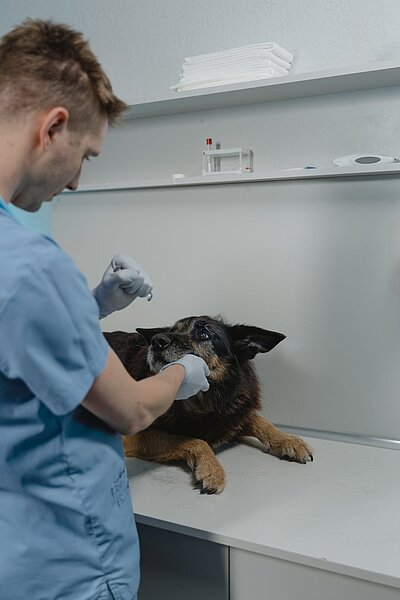Liver disease

The liver is a vital organ for dogs that fulfills many important functions. Among other things, it is responsible for detoxifying the blood, producing bile, storing vitamins and regulating the metabolism. If the liver becomes diseased, this can have serious consequences for your dog's health and well-being.
Causes and symptoms of liver disease
There are various causes of liver disease in dogs, such as infections, poisoning, tumors, genetic defects or age-related wear and tear. The symptoms of liver disease can vary depending on the severity and cause, but some common signs include
- Loss of appetite
- weight loss
- vomiting
- diarrhea
- Jaundice (yellowing of the skin, mucous membranes and eyes)
- Abdominal swelling
- Behavioral changes (e.g. lethargy, confusion, aggressiveness)
- Bleeding (e.g. from the nose, mouth or anus)
Diagnosis and treatment of liver disease
If you suspect that your dog is suffering from liver disease, you should take him to the vet as soon as possible. The vet will carry out a thorough examination and order various tests to check the function and condition of the liver. These may include blood tests, urinalysis, ultrasound examinations or biopsies.
The treatment of liver disease depends on the cause and severity of the disease. In some cases, drug therapy may be sufficient to reduce inflammation and alleviate symptoms. In other cases, a special diet may be required to reduce the burden on the liver and improve the supply of nutrients. In severe cases, surgery or even a liver transplant may be necessary to save the dog's life.
Prevention of liver disease
You can take some steps to reduce or at least minimize the risk of liver disease in your dog. These include:
- Avoid giving or exposing your dog to toxic substances (e.g. chocolate, onions, garlic, alcohol, medications, pesticides)
- Keep your dog away from infected animals and have him regularly vaccinated against diseases such as leptospirosis or hepatitis
- Feed your dog high-quality food that is tailored to his needs
- Make sure your dog gets enough exercise and fresh water
- Have your dog checked regularly by the vet and follow their recommendations
The liver is an important organ for your dog that you should not neglect. If you take care of the health of your liver, you can give your dog a long and happy life.
The authors assume that a veterinarian should be consulted if an animal is ill and that medication should only be taken after consultation with a doctor or pharmacist. Only an individual examination can lead to a diagnosis and treatment decision.
We help you find the nearest vet → This way